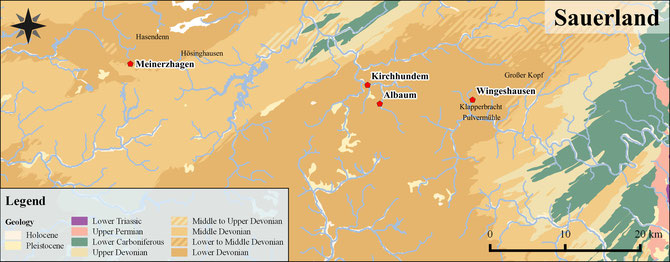North Rhine-Westfalia
The Western Germany lithophysae agates are really really rare to find and pretty old. They come from Devonian keratophyr deposits. The oldest known agates from Germany.

Sources:
- "Bergisches Land"
- Kirchhundem "Albaum"
- Meinerzhagen
- Hasendenn
- Hösinghausen
- Wingeshausen
-
Bilsburg
- Großer Kopf
- Klapperbracht
- Kleiner Kopf
-
Krumme Frau (aka. Schwarzbachtal)
- Mühlenköpfchen
- Pulvermühle
- Steinhorst aka. Weidiger Weg
Kirchhundem "Albaum"
The source of Albaum lies south to the village of Kirchhundem in the district of Olpe. The outcrop is lying in a forest and is about 8 to 100 m large. The sediments are classified as quartz keratophyr which is an extrusive rock from the Devonian time.
The eggs are quite rare (2 or 3 per m²) and vary in size between 1,5 to 5cm (d = 3cm). The matrix is typically red or brown cause of iron and manganese minerals. Whitish matrix is weathered. The filling is also very different from egg to egg. Usually one can find chalcedony or quartz filling. The chalcedony can be level banded. Agate is quite rare, carnelian more often.
(From the article in the Mineralien-Welt 3/2011 by Ruthenbürger & Wirausky)

size: ~60x50 mm
That's a very rare thunderegg from a town called Albaum near Kirchhundem. It's filled with carnelian and has a sligthly banding.
Meinerzhagen
Those thundereggs seem to be more rare than all the other rareties in this area. As far as I have seen only conglomerates of tiny eggs.
Hasendenn

size: 70x37 mm
Fine conglomerate of tiny little thundereggs from the sublocation Hasendenn. Mostly filled with Illite or metallic minerals.
Hösinghausen

size: 87x40 mm
A bit different in the colors of the matrix but a similar conglomerate coming from the sublocation near Hösinghausen.
Wingeshausen
Here are some eggs from another source in North Rhine-Westfalia in the area of Wingeshausen. There are actually 8 sublocations known to me. The eggs show a nice variety in matrix and can have chalcedony with or without a scant banding of carnelian but mostly they are filled with some iron minerals - sometimes in combination with chalcedony. Mudballs are also typical. They are filled with nothing and even the walls of the chamber are just empty of mineralization.
Important information: Surface collecting is possible, digging is strictly forbidden (nature reserve)!!
Bilsburg

size: 148x127 mm
First to go a very large specimen from Bilsburg Mt. with iron minerals and some kind of brown Illite in the top triangle chamber.
Krumme Frau (aka. Schwarzbachtal)
Those eggs are from the sub-location at the slopes of the Krumme Frau Mt. in the Schwarzbachtal. Mostly mudballs with or without iron mineralizations.
#1: 44x36 mm
#2: 53x44 mm
#3: 61x30 mm
Steinhorst aka. Weidiger Weg
Some specimens from an old source in this area called Steinhorst or Weidiger Weg.
#1: 58x53 mm
#2: 47x43 mm
#3: 60x53 mm
#4: 61x52 mm




















